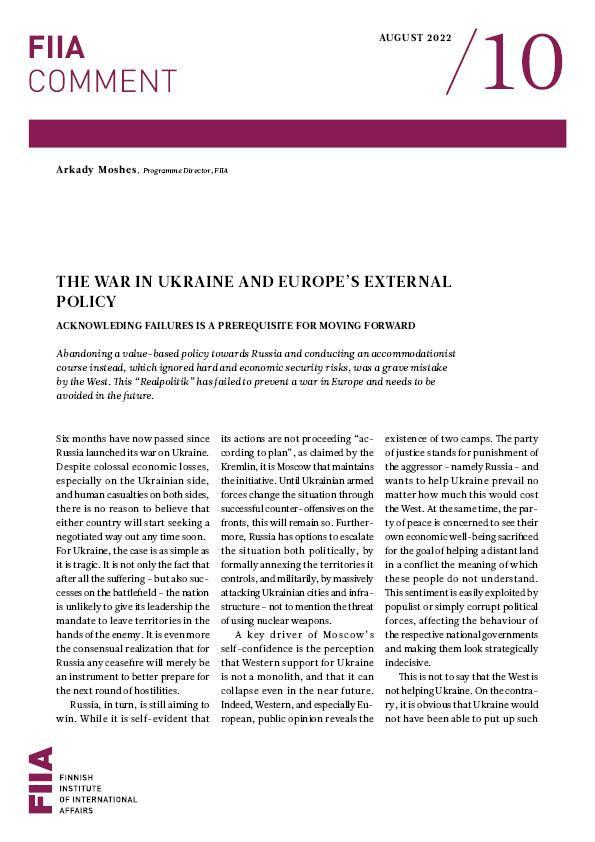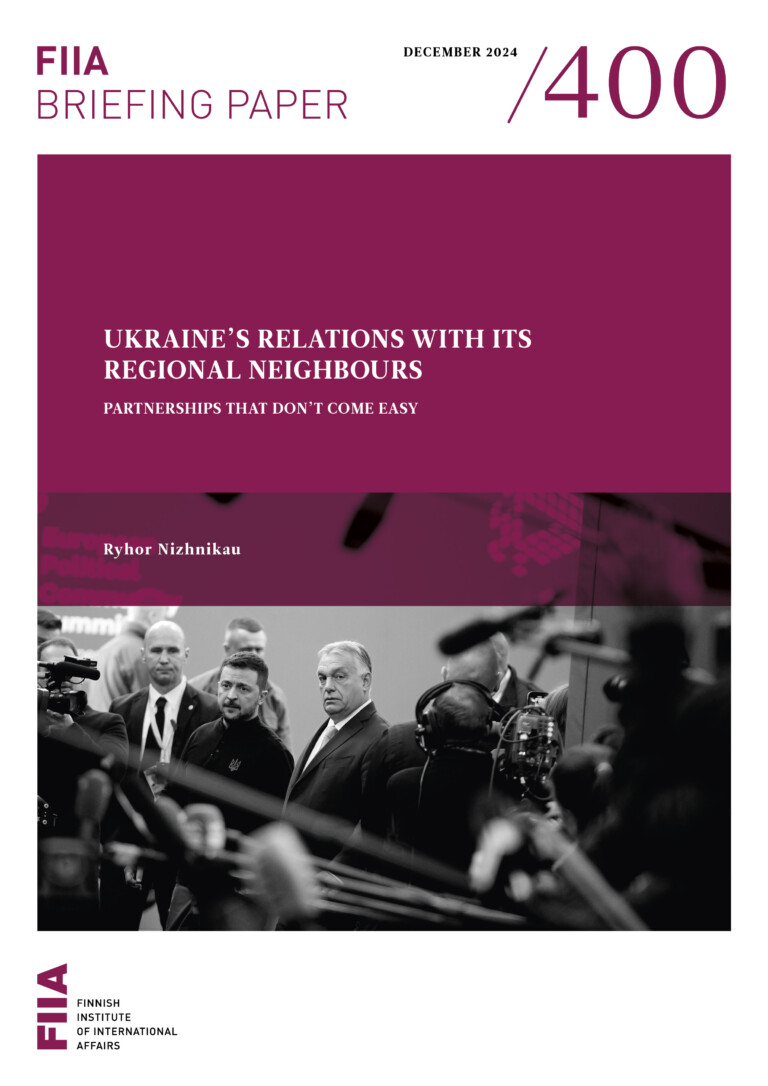Abandoning a value-based policy towards Russia and conducting an accommodationist course instead, which ignored hard and economic security risks, was a grave mistake by the West. This “Realpolitik” has failed to prevent a war in Europe and needs to be avoided in the future.
Six months have now passed since Russia launched its war on Ukraine. Despite colossal economic losses, especially on the Ukrainian side, and human casualties on both sides, there is no reason to believe that either country will start seeking a negotiated way out any time soon.
For Ukraine, the case is as simple as it is tragic. It is not only the fact that after all the suffering – but also successes on the battlefield – the nation is unlikely to give its leadership the mandate to leave territories in the hands of the enemy. It is even more the consensual realization that for Russia any ceasefire will merely be an instrument to better prepare for the next round of hostilities.
Russia, in turn, is still aiming to win. While it is self-evident that its actions are not proceeding “according to plan”, as claimed by the Kremlin, it is Moscow that maintains the initiative. Until Ukrainian armed forces change the situation through successful counter-offensives on the fronts, this will remain so. Furthermore, Russia has options to escalate the situation both politically, by formally annexing the territories it controls, and militarily, by massively attacking Ukrainian cities and infrastructure – not to mention the threat of using nuclear weapons.
A key driver of Moscow’s self-confidence is the perception that Western support for Ukraine is not a monolith, and that it can collapse even in the near future. Indeed, Western, and especially European, public opinion reveals the existence of two camps. The party of justice stands for punishment of the aggressor – namely Russia – and wants to help Ukraine prevail no matter how much this would cost the West. At the same time, the party of peace is concerned to see their own economic well-being sacrificed for the goal of helping a distant land in a conflict the meaning of which these people do not understand. This sentiment is easily exploited by populist or simply corrupt political forces, affecting the behaviour of the respective national governments and making them look strategically indecisive.
This is not to say that the West is not helping Ukraine. On the contrary, it is obvious that Ukraine would not have been able to put up such strong resistance without Western assistance. In the first weeks of the war, Kyiv could not have imagined the weapon systems it is now receiving. Millions of Ukrainians have found refuge in Western countries. Economic sanctions on Russia, even though many questions can be asked with regard to their integrity and effectiveness, limit Russia’s capabilities to wage the war. Western companies are leaving the country, taking their know-how with them.
Nevertheless, Western leaders have not done enough to signal to Russia that the change in their mutual relations is irreversible. And they have done even less to explain to European citizens why it should be irreversible for many years to come. Perhaps some of them have not been able to clearly admit this to themselves either, which is one reason for the apparent political ambivalence.
This ambivalence has to be overcome. To this end, the discussion on the Western external and security policy, which intensified in the context of the war in Ukraine, should be reviewed in order to address two points.
First, it needs to be acknowledged that abandoning a value-based policy towards Russia in favour of the so-called “interest-based” Realpolitik was a mistake. If the West, which was seeking access to Russia’s markets and energy projects, had not stopped democracy promotion in the country in the mid-2000s, it would have maintained the respect of the then still significant pro-European groups in Russian society. After the West “sold democracy”, most Russians no longer saw a difference between local and European “pragmatists” and ceased to be Europe’s committed allies inside the country. If the West had not responded to Russia’s use of military force in Georgia in 2008 by offering it President Barak Obama’s “reset” of US-Russian relations and Europe’s “Partnership for Russia’s modernization”, and if the West had reacted to the annexation of Crimea in 2014 not with words only, the full-scale war in Ukraine might have been avoided.
Most likely, a transparent value-based policy would not have prevented the conflict between Russia and the West, but accommodationist Realpolitik did not do that either. Crucially, the former would not have created an impression in the Kremlin that the West can be either intimidated or bought.
Second, it has to be realized that the post-modern period in European security, when economic and soft power provided it with political leverage, is long gone. European leaders had at least 16 years, starting from the first complete cut-off in Russian gas deliveries to Ukraine in winter 2006, to diversify gas supplies, but they chose to ignore the risks and only increased the energy dependence on Russia. From now on, hard security, both military and economic, will need to be given priority. One cannot depend to such a degree on Russia for gas, nor on Turkey to fight illegal migration, nor on China for supplies of industrial goods, and feel totally secure.
The adoption of these two premises would not immediately affect the situation in Ukraine. But if they are accepted by Western leaders and properly communicated to the people, it would remove the prospect of Europe’s surrender in the face of Russian pressure, and of a deal at the expense of Ukraine. Most importantly, this would send a signal that Europe is relearning how to speak the language of power, which is the language that its non-Western partners understand best.






